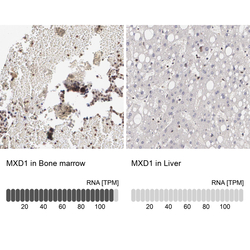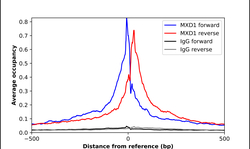Antibody data
- Antibody Data
- Antigen structure
- References [3]
- Comments [0]
- Validations
- Immunohistochemistry [1]
- Chromatin Immunoprecipitation [1]
Submit
Validation data
Reference
Comment
Report error
- Product number
- HPA001599 - Provider product page

- Provider
- Atlas Antibodies
- Proper citation
- Atlas Antibodies Cat#HPA001599, RRID:AB_1079434
- Product name
- Anti-MXD1
- Antibody type
- Polyclonal
- Description
- Polyclonal Antibody against Human MXD1, Gene description: MAX dimerization protein 1, Alternative Gene Names: bHLHc58, MAD, MAD1, Validated applications: ChIP, IHC, Uniprot ID: Q05195, Storage: Store at +4°C for short term storage. Long time storage is recommended at -20°C.
- Reactivity
- Human
- Host
- Rabbit
- Conjugate
- Unconjugated
- Isotype
- IgG
- Vial size
- 100 µl
- Concentration
- 0.2 mg/ml
- Storage
- Store at +4°C for short term storage. Long time storage is recommended at -20°C.
- Handling
- The antibody solution should be gently mixed before use.
Submitted references HOXA5 inhibits the proliferation of extrahepatic cholangiocarcinoma cells by enhancing MXD1 expression and activating the p53 pathway.
MXD1 is a Potential Prognostic Biomarker and Correlated With Specific Molecular Change and Tumor Microenvironment Feature in Esophageal Squamous Cell Carcinoma
Gleason Score 7 Prostate Cancers Emerge through Branched Evolution of Clonal Gleason Pattern 3 and 4
Xiong F, Liu W, Wang X, Wu G, Wang Q, Guo T, Huang W, Wang B, Chen Y
Cell death & disease 2022 Sep 27;13(9):829
Cell death & disease 2022 Sep 27;13(9):829
MXD1 is a Potential Prognostic Biomarker and Correlated With Specific Molecular Change and Tumor Microenvironment Feature in Esophageal Squamous Cell Carcinoma
Du F, Dong D, Zhang X, Jia J
Technology in Cancer Research & Treatment 2021;20
Technology in Cancer Research & Treatment 2021;20
Gleason Score 7 Prostate Cancers Emerge through Branched Evolution of Clonal Gleason Pattern 3 and 4
Sowalsky A, Kissick H, Gerrin S, Schaefer R, Xia Z, Russo J, Arredouani M, Bubley G, Sanda M, Li W, Ye H, Balk S
Clinical Cancer Research 2017;23(14):3823-3833
Clinical Cancer Research 2017;23(14):3823-3833
No comments: Submit comment
Supportive validation
- Submitted by
- Atlas Antibodies (provider)
- Enhanced method
- Orthogonal validation
- Main image

- Experimental details
- Immunohistochemistry analysis in human bone marrow and liver tissues using Anti-MXD1 antibody. Corresponding MXD1 RNA-seq data are presented for the same tissues.
- Sample type
- Human
- Protocol
- Protocol
Supportive validation
- Submitted by
- Atlas Antibodies (provider)
- Main image

- Experimental details
- ChIP-Exo-Seq composite graph for Anti-MXD1 (HPA001599, Lot A96690) tested in K562 cells. Strand-specific reads (blue: forward, red: reverse) and IgG controls (black: forward, grey: reverse) are plotted against the distance from a composite set of reference binding sites. The antibody exhibits robust target enrichment compared to a non-specific IgG control and precisely reveals its structural organization around the binding site. Data generated by Prof. B. F. Pugh´s Lab at Cornell University.
 Explore
Explore Validate
Validate Learn
Learn Immunohistochemistry
Immunohistochemistry